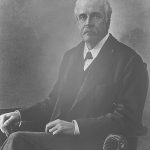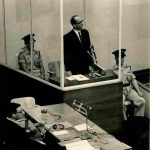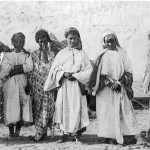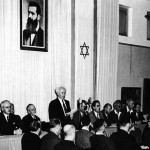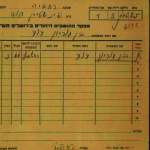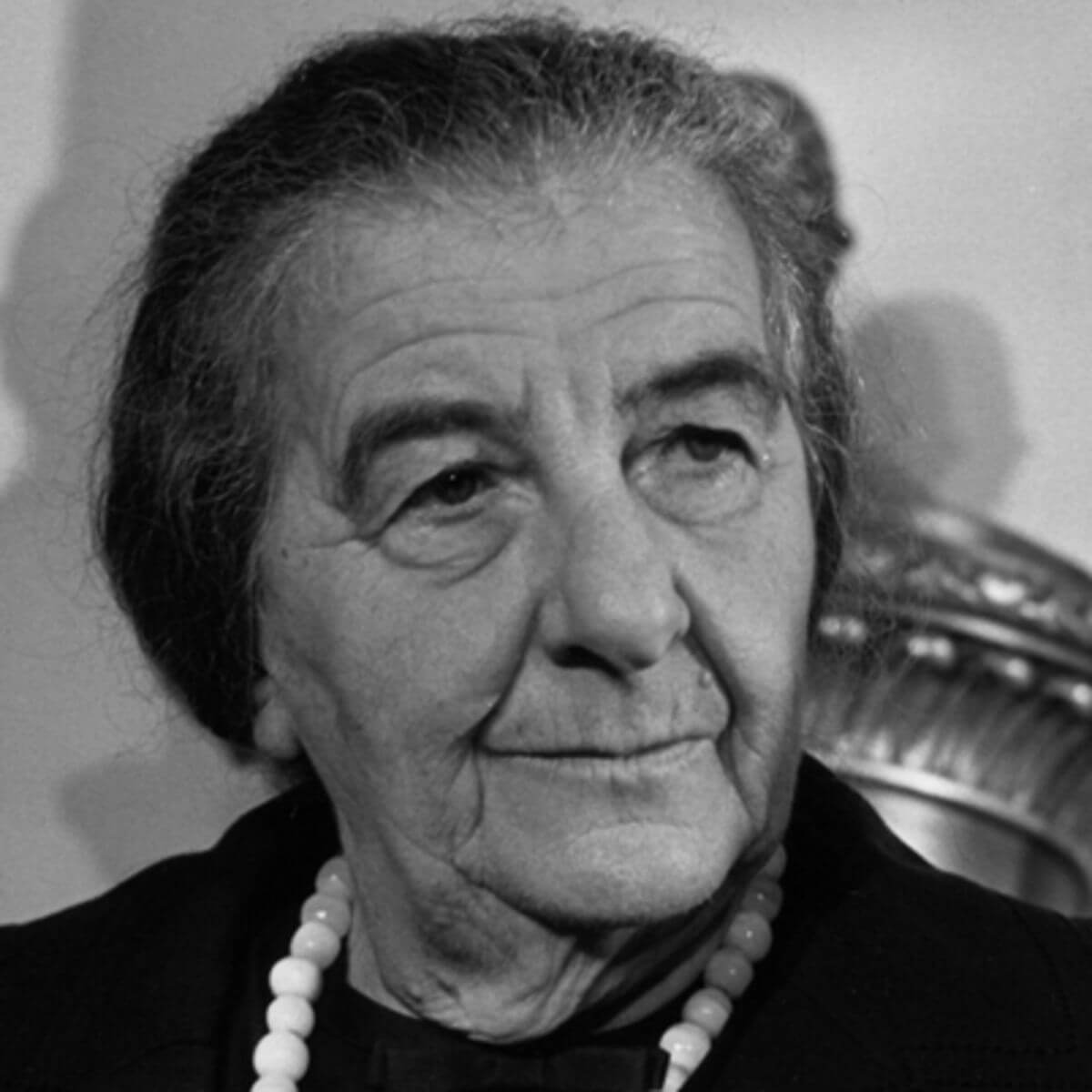In his report on 6 September to the team of ministers (see Document 15), Mossad chief Zamir said that he had asked his German counterpart what would happen now, since the terrorists could hijack a Lufthansa plane and force the Germans to release the surviving terrorists. The head of German intelligence replied that he could not promise this would not happen. The prime minister repeated this assessment at a government meeting on 11 September. The government discussed the possibility of requesting extradition of the three terrorists to Israel, but decided against it.
On 29 October these fears were realized. A Lufthansa plane on a flight from Beirut to Munich was hijacked at 8:00 in the morning by three terrorists. After refuelling in Nicosia and Zagreb, the hijackers announced their intention to fly to Munich and explode the plane, if the three terrorists involved in the attack on the Israeli delegation were not released. In the end, the plane returned to Zagreb and circled the airport, while the hijackers demanded that the three terrorists also be flown to that city; otherwise they would explode the plane with all its passengers. In Israel, preliminary consultations were held with politicians and the intelligence community, summarized by Yisrael Galili and Abba Eban in their own handwriting for the prime minister (Document 37). In these consultations, and at a government meeting convened as the Ministerial Committee for Security Matters, it was decided to urge the German government not to capitulate to any demands. “Releasing the terrorists will only add to the Munich disaster”, the government declared. A telegram with the text of the decision was sent to the Israeli ambassador in Bonn. The Bonn government met in emergency session and Ambassador Ben-Horin presented it with the Israeli government’s message, expressing complete opposition to the release of the terrorists, and saying that Israel’s response this time would not be reasonable and restrained, as it was after the Munich disaster. Ambassador Ben-Horin reported on developments by telephone to the Foreign Ministry (Document 39). During all that time it was not clear what the German government’s decision was; however, at 15:00 p.m. it was discovered that the Germans had given in, and the three terrorists were released and flown to Zagreb. After negotiations the Lufthansa plane finally took off with the three hijackers, the three released terrorists and the crew and passengers from Zagreb to Libya.
The release of the terrorists aroused outrage in Israel. The media carried extreme expressions against West Germany, and this time did not trouble to hide analogies between Germany’s actions and its Nazi past. Organizations and institutions cancelled delegations to Germany. The German actions also led to a diplomatic crisis between Israel and West Germany, which was among the most severe since diplomatic relations were established in 1965. The Israeli government did not disguise its great anger at the West German government. Foreign Minister Eban met with the German ambassador in Israel, and expressed this anger in no uncertain terms, saying: “The main result is that the three terrorists have been released, and they are now free to commit more crimes and to murder more Israelis. To some degree, it is as if the action passes a death sentence on other Israelis” (Document 40).
The following day the prime minister made a strong statement to the Knesset. The Knesset itself condemned the actions of the German government and the Israeli ambassador in West Germany was called home for consultations. On 5 November the government held a discussion about the release of the Munich murderers, with the participation of the ambassador, Elyashiv Ben-Horin. He presented a report on the events, his contacts with representatives of the German government, and reactions in Germany to the events and the severe criticism from Israel on the eve of the general elections. He reported that in Germany “there are expressions of feelings of shame, incompetence and failure”, following the events in Munich and Zagreb. The ministers’ statements this time included harsh criticism of Germany, and in view of the public atmosphere, all of them referred to the link between current events and Germany’s Nazi past. Foreign Minister Eban described the German surprise at the severity of the reactions in Israel, and noted that though they recognize the great sensitivity there in all things related to Germany, “they don’t accept the comments that this is in some way connected to the Holocaust or Nazism”. The ministers expressed anger at the statement of the spokesman for the German government, that “It was not Germany that caused the dispute in the Middle East”, and the comparison between this event and Israel’s willingness to release terrorists when an El Al plane was hijacked to Algeria, in July 1968.
Minister Warhaftig protested that “the murder of six million Jews did have an influence on the state of affairs in the Middle East”. He even argued that the public was wondering “if there wasn’t a conspiracy here between the German authorities and the terrorists, in order to be rid swiftly of the murderers who weighed, not on the Germans’ conscience, but on their peace and quiet and on their interests”. A debate followed regarding the severity of the Israeli reaction: whether it should go so far as to damage relations with Germany, or whether it should preserve these relations, which were clearly in Israel’s interest.
Golda Meir did not rule out the hints of Warhaftig and others regarding a possible conspiracy. “Everything happened so fast, they didn’t even try to bargain with them. As if the helicopters were ready and waiting for the terrorists”, she said. She strongly attacked the actions of the German government and its spokesmen, and their obsequious attitude to the Arabs. However, she said: “I wouldn’t link what happened now with the Holocaust. We can’t throw this at Brandt”. She noted: “Of course it would be foolish to act in a manner that would be harmful to us, but the Germans should feel that the issue is still open, and has not been resolved”.
The government issued a statement denouncing the release of the terrorists and the statements in Germany, and noted: “The ambassador’s report on the position and explanations of the government of the German Republic have not changed the government’s position, and have not dispelled the anger that was expressed in the government’s statement to the Knesset and on other occasions” (Stenogram of the meeting and the government statement in Document 43).
The harsh reaction in Israel, especially the comments comparing the German government’s actions with the Nazi period, were received with anger in Germany and Willy Brandt, who had been a strong opponent of the Nazi party and active in the underground against it, felt personally insulted. He sent a personal message to Prime Minister Meir, explaining that the decision by the West German and Bavarian governments to release the terrorists resulted from lack of choice and the desire to prevent loss of life. It did not mean surrender to terror, and the Federal government would make every effort to fight terror relentlessly. He expressed his pain at the anti-German comments in Israel, and vehemently objected to the comparison with dark periods in Germany’s history. He called for a joint effort to prevent harming relations between the two countries (Document 44 in English and German).
On 8 November the German ambassador in Israel presented the message to the prime minister. In light of the message from her friend, Willy Brandt, Golda Meir also took a conciliatory position. She explained that there had not been any intention to cause injury to the chancellor in the official statements by Israeli spokesmen, and emphasized that “we know very well how to differentiate between what happened last week, and the terrible period of the Holocaust”. She requested that he, for his part, understand the harsh reactions in Israel in light of the severe trauma of the murder of the athletes in Munich, and protested at statements by German leaders (Document 45).
Brandt’s message and Golda’s meeting with the German ambassador gave the signal to damp down the confrontation between Germany and Israel over the release of the Munich terrorists, and in the following weeks relations between the two countries began to return to their previous state.
See also: Documents 38, 41 and 42.


